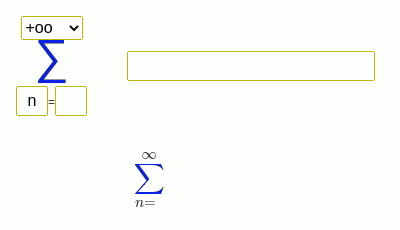Sum of series (n*x^n)/(n+1)
The solution
You have entered
[src]
oo ____ \ ` \ n \ n*x / ----- / n + 1 /___, n = 0
$$\sum_{n=0}^{\infty} \frac{n x^{n}}{n + 1}$$
Sum((n*x^n)/(n + 1), (n, 0, oo))
The radius of convergence of the power series
Given number:
$$\frac{n x^{n}}{n + 1}$$
It is a series of species
$$a_{n} \left(c x - x_{0}\right)^{d n}$$
- power series.
The radius of convergence of a power series can be calculated by the formula:
$$R^{d} = \frac{x_{0} + \lim_{n \to \infty} \left|{\frac{a_{n}}{a_{n + 1}}}\right|}{c}$$
In this case
$$a_{n} = \frac{n}{n + 1}$$
and
$$x_{0} = 0$$
,
$$d = 1$$
,
$$c = 1$$
then
$$R = \lim_{n \to \infty}\left(\frac{n \left(n + 2\right)}{\left(n + 1\right)^{2}}\right)$$
Let's take the limit
we find
$$R = 1$$
$$\frac{n x^{n}}{n + 1}$$
It is a series of species
$$a_{n} \left(c x - x_{0}\right)^{d n}$$
- power series.
The radius of convergence of a power series can be calculated by the formula:
$$R^{d} = \frac{x_{0} + \lim_{n \to \infty} \left|{\frac{a_{n}}{a_{n + 1}}}\right|}{c}$$
In this case
$$a_{n} = \frac{n}{n + 1}$$
and
$$x_{0} = 0$$
,
$$d = 1$$
,
$$c = 1$$
then
$$R = \lim_{n \to \infty}\left(\frac{n \left(n + 2\right)}{\left(n + 1\right)^{2}}\right)$$
Let's take the limit
we find
$$R = 1$$
The answer
[src]
/ / 2 2*log(1 - x)\ |x*|- ------ + ------------| | | 2 2 | | \ x - x x / |--------------------------- for |x| < 1 | 2 | | oo < ____ | \ ` | \ n | \ n*x | / ----- otherwise | / 1 + n | /___, | n = 0 \
$$\begin{cases} \frac{x \left(- \frac{2}{x^{2} - x} + \frac{2 \log{\left(1 - x \right)}}{x^{2}}\right)}{2} & \text{for}\: \left|{x}\right| < 1 \\\sum_{n=0}^{\infty} \frac{n x^{n}}{n + 1} & \text{otherwise} \end{cases}$$
Piecewise((x*(-2/(x^2 - x) + 2*log(1 - x)/x^2)/2, |x| < 1), (Sum(n*x^n/(1 + n), (n, 0, oo)), True))

Examples of finding the sum of a series
- The Sum of the Power Series
x^n/n
(x-1)^n
- Factorial
1/2^(n!)
n^2/n!
x^n/n!
k!/(n!*(n+k)!)
- Flint Hills Series
csc(n)^2/n^3
- Basel problem
1/n^2
1/n^4
1/n^6
- Harmonic series
1/n
- Grandi's series
(-1)^n
- Alternating series
(-1)^(n + 1)/n
(n + 2)*(-1)^(n - 1)
(3*n - 1)/(-5)^n
(-1)^(n - 1)*n/(6*n - 5)
- Newton–Mercator series
(-1)^(n + 1)/n*x^n
- Exam the series for convergence
(3*n - 1)/(-5)^n

 lnn/n
lnn/n
 (n^3+n+5)/(n+6)
(n^3+n+5)/(n+6)